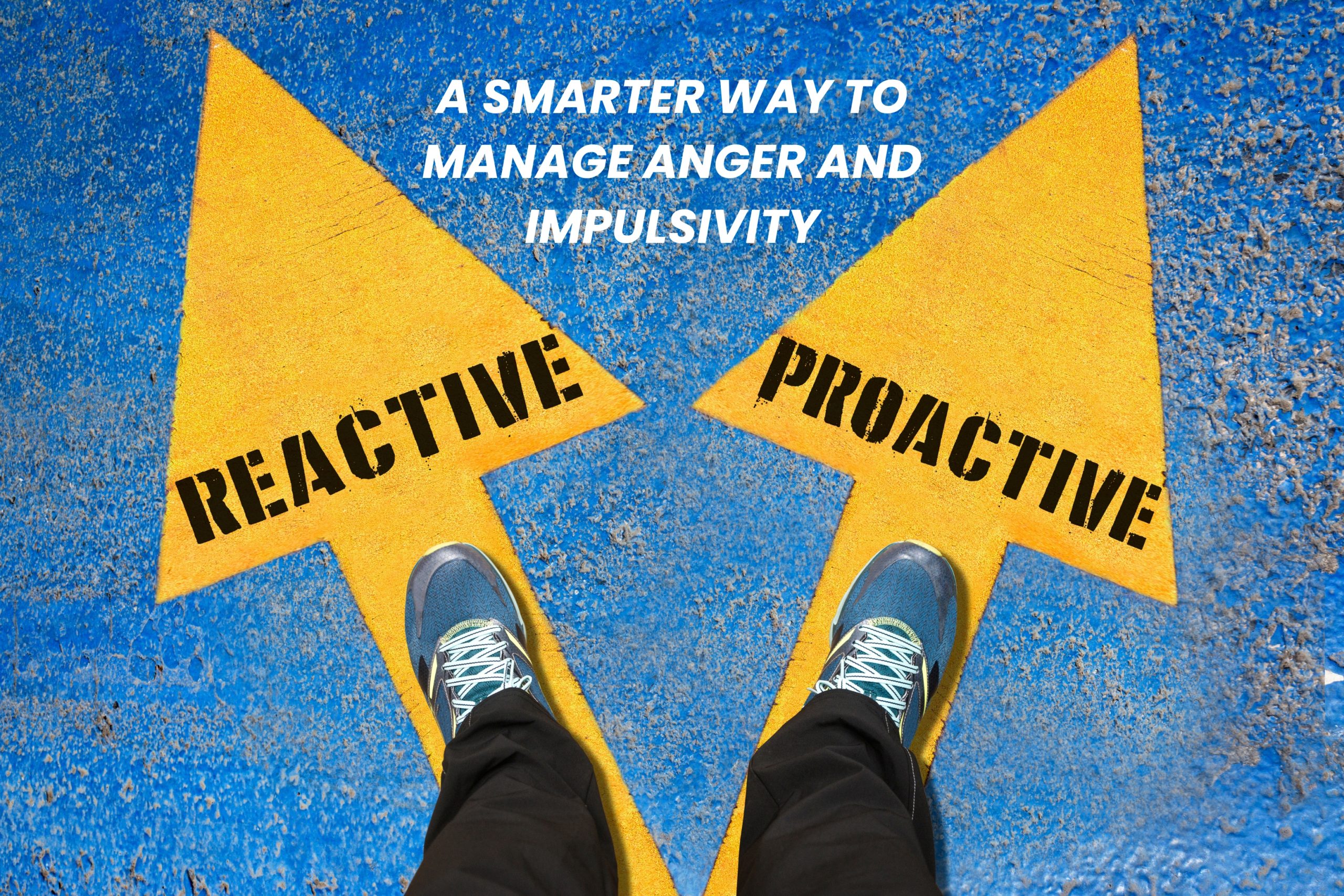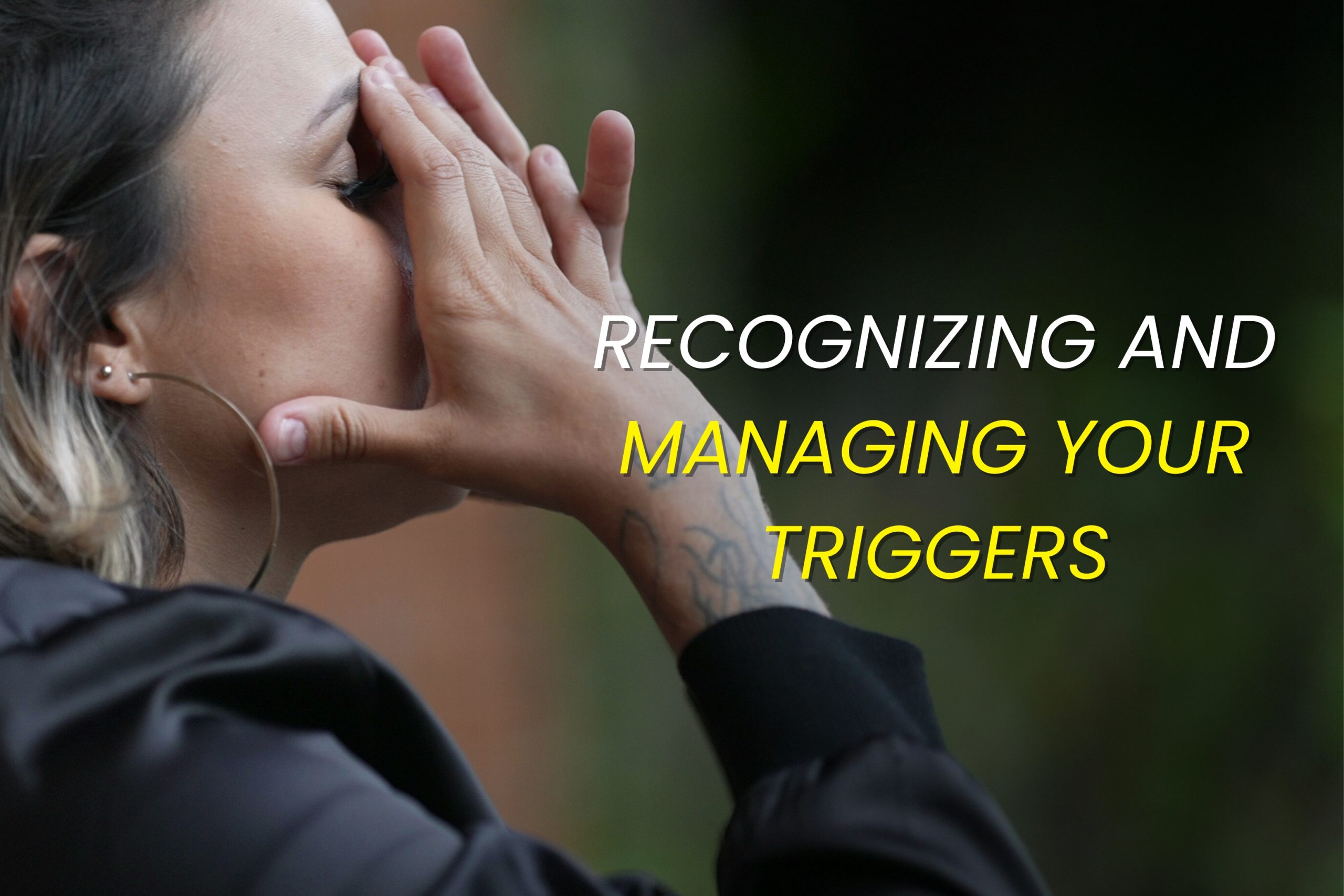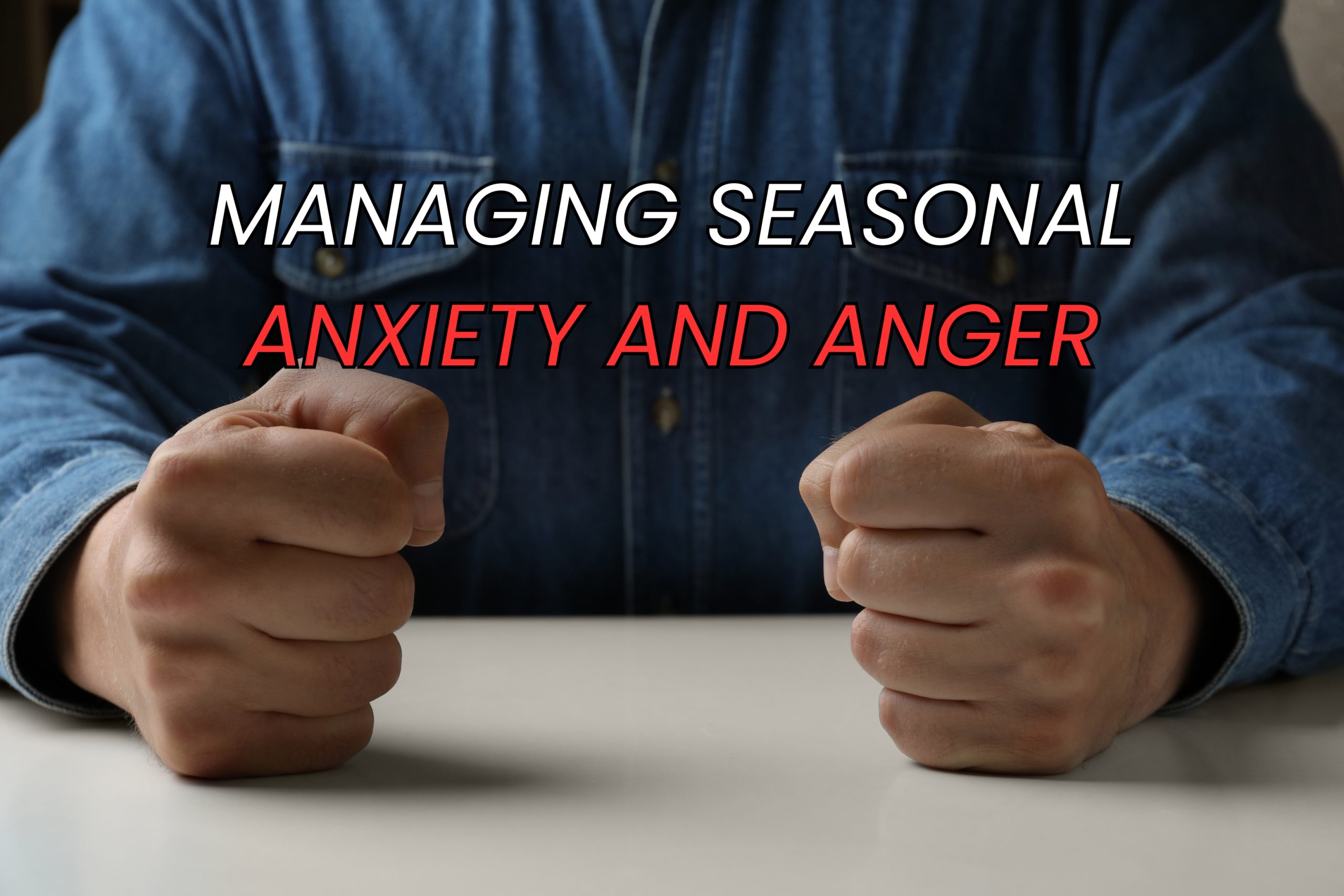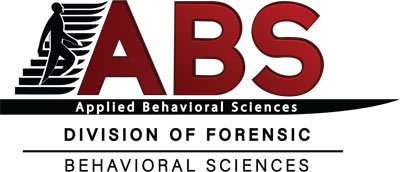
Be Proactive, Not Reactive: A Smarter Way to Manage Anger and Impulsivity
By ABS Behavioral Health
If you’ve ever said “I just snapped” or “I didn’t even think before I reacted,” you’re not alone. Reactive behavior — especially when tied to anger or impulsivity — can damage relationships, disrupt your life, and leave you feeling frustrated with yourself.
But here’s the good news: You can shift from reacting impulsively to responding intentionally. This is what it means to be proactive — and it’s a game-changer for your mental health.
At ABS Behavioral Health, we’re passionate about helping individuals understand their emotional patterns and apply real strategies for lasting change.
⚡ What’s the Difference Between Proactive and Reactive?
Reactive behavior is driven by emotion in the moment — anger, frustration, stress, fear.
Proactive behavior is thoughtful, planned, and grounded in self-awareness.
| Reactive | Proactive |
|---|---|
| Yells in the heat of the moment | Takes a breath before responding |
| Acts on impulse | Reflects on possible outcomes |
| Blames others | Owns emotions and behavior |
| Regrets decisions | Chooses actions with clarity |
🛠 5 Proactive Tools to Manage Anger & Impulsivity
1. Know Your Triggers
You can’t change what you don’t understand.
Keep a simple log:
- What triggered me?
- What emotion did I feel?
- What was my response?
Pro Tip: Look for patterns in situations, times of day, or people that consistently push your buttons.
2. Use the 10-Second Rule
When you feel anger rise or an impulsive urge, count to 10 slowly and breathe.
This short pause helps shift your brain from “reaction mode” to “thinking mode.”
3. Plan Ahead for Stressful Situations
If you know you’re about to be in a high-pressure setting (work meeting, family gathering, rush-hour traffic), prepare mentally.
Ask:
- What might trigger me?
- How do I want to respond instead?
This is proactive emotional preparation — and it works.
4. Practice Daily Regulation
Make emotional self-care part of your routine:
- Exercise regularly
- Sleep 7–8 hours a night
- Journal or meditate for 5–10 minutes
- Limit caffeine and sugar if they increase agitation
These habits help lower your emotional baseline, so you’re less likely to explode.
5. Create a Personal “Calm Plan”
Write down 3–5 things you can do when you’re triggered:
- Walk away and stretch
- Text a supportive friend
- Use grounding techniques
- Watch a calming video
- Do breathing exercises
Put your Calm Plan somewhere visible — your desk, phone, or car.
🧭 When to Ask for Help
If your anger or impulsive behavior is hurting your relationships, career, or mental health, don’t ignore it. You deserve support — not shame.
At ABS Behavioral Health, we offer:
- Individual anger management counseling
- Group therapy focused on emotional regulation
- Trauma-informed therapy
- ADHD and impulse control support
👉 Tired of reacting and regretting?
Take control of your emotions with ABS Behavioral Health.
📞 Call us at 718-871-4593 or 📩 Request an Appointment Online (Make Intake Appointment)
Being proactive starts with one choice — we’re here to help.

The Power of Pause: Techniques to Control Reactive Anger
By ABS Behavioral Health
We’ve all had moments where we said or did something in anger — and regretted it almost immediately. Reactive anger is fast, loud, and often damaging. It can fracture relationships, derail work, and leave you feeling ashamed or exhausted.
But what if you could interrupt that emotional storm before it explodes?
At ABS Behavioral Health, we believe in practical tools that make emotional control possible — not just in theory, but in everyday life. This blog is designed to help you understand reactive anger and introduce “The Power of Pause” — a simple yet transformative method to take back control.
🧠 What Is Reactive Anger?
Reactive anger is an immediate emotional response to a perceived threat, insult, or frustration. It’s the kind of anger that comes without thinking — and it often comes with:
- Yelling or cursing
- Slamming doors or throwing things
- Shutting down or withdrawing
- Sarcasm or hurtful words
- Physical aggression or threats
Reactive anger is often rooted in past trauma, stress overload, or poor emotional regulation — but it doesn’t have to define you.
⏸ What Is “The Power of Pause”?
The Power of Pause is the ability to interrupt your automatic reaction before it turns into an outburst.
It’s not about bottling anger or pretending everything’s fine — it’s about giving your brain time to catch up to your emotions so you can respond rather than react.
🛠 3 Pause Techniques to Practice Daily
1. The 5-Second Rule
When anger rises, pause and count backwards: 5-4-3-2-1.
This simple delay gives your rational brain a chance to engage.
2. Name It to Tame It
Say what you’re feeling — either silently or aloud.
“I’m angry.” “I feel disrespected.” “I’m overwhelmed.”
Naming emotions activates the thinking part of your brain and calms the emotional part.
3. Take a Physical Reset
Walk out of the room. Take a cold drink of water. Splash cold water on your face.
Changing your physical state changes your emotional intensity.
🔄 Practice Makes Pause
Like anything else, learning to pause takes practice. Start with these ideas:
- Set an alarm with the word “PAUSE” once a day
- Write “Pause Before You React” on a sticky note and place it near your workspace
- Role-play triggering situations with a friend or therapist and practice your pause tools
💬 When to Get Help
If anger is hurting your relationships, job, or self-worth — or if you feel unable to control your reactions — it’s time to seek support.
At ABS Behavioral Health, we offer:
- Anger management therapy
- Trauma-informed care
- Cognitive Behavioral Therapy (CBT)
- Personalized emotional regulation plans
You don’t have to keep reacting — you can learn to respond with strength and peace.
👉 Ready to take control of your reactions?
Contact ABS Behavioral Health today to begin the journey toward calm, confidence, and healthy communication.
📞 Call us at 718-871-4593 or 📩 Request an Appointment Online (Make Intake Appointment)
One pause can change everything.

Understanding Impulsivity: Recognizing and Managing Your Triggers
By ABS Behavioral Health
We all make quick decisions sometimes — but when impulsive behavior becomes a pattern, it can hurt our relationships, health, and mental well-being.
Impulsivity often looks like:
- Saying things you regret
- Reacting with anger or aggression
- Overspending or binge eating
- Interrupting conversations
- Making risky or emotional decisions without thinking them through
At ABS Behavioral Health, we don’t just label behavior — we help people understand it and learn tools to manage it. This blog will give you real, practical steps to manage impulsivity and identify your emotional triggers.
🧠 What Is Impulsivity?
Impulsivity is acting without thinking. It’s closely tied to how your brain handles reward, emotional regulation, and self-control. Often, people act impulsively when they’re feeling overwhelmed, overstimulated, or under stress.
It’s especially common in those dealing with:
- Anxiety
- Depression
- ADHD
- Trauma or PTSD
- Substance abuse history
But impulsivity doesn’t mean you’re out of control — it means your nervous system is in survival mode more often than it needs to be. And that can be changed.
🔍 Step 1: Identify Your Triggers
Start by noticing when your impulsive behaviors show up.
Ask yourself:
- Was I tired, hungry, or overstimulated?
- Was I feeling rejected, judged, or unheard?
- Did I have a stressful interaction or confrontation before the behavior?
Pro Tip: Keep a log for 1 week. Write down what happened before, during, and after your impulsive reaction. This helps uncover your personal triggers and patterns.
🛠 Step 2: Use a Pause Strategy
You can learn to interrupt the automatic response.
Try this 4-second impulse breaker:
- STOP – Say the word “Stop” in your mind.
- BREATHE – Inhale for 4 seconds, hold for 4, exhale for 4.
- NOTICE – Label the emotion (e.g., “I’m feeling angry/frustrated”).
- CHOOSE – Ask yourself, “What’s the best outcome I want here?”
Doing this regularly rewires your brain to insert space between trigger and reaction.
🧩 Step 3: Build Your Emotional Toolbox
Here are some strategies you can begin using daily:
- Daily movement or exercise: Helps regulate mood and reduce impulsivity
- Mindfulness practices: Apps like Calm or Headspace are great for beginners
- Journaling: Helps slow down your thinking and make space for reflection
- Avoid overstimulation: Limit caffeine, reduce screen time, and get better sleep
Even small shifts create big changes over time.
🙋♂️ When to Seek Help
If impulsive behavior is damaging your relationships, finances, or peace of mind, you don’t have to go it alone.
ABS Behavioral Health offers therapy programs that help with:
- Emotional regulation
- Anger management
- ADHD or anxiety-related impulsivity
- Trauma-informed care
Whether you need individual therapy or group support, our team can help you identify the root cause and create a plan for change.
👉 Struggling with impulsive reactions or anger?
Let ABS Behavioral Health help you regain control.
📞 Call us at 718-871-4593 or 📩 Request an Appointment Online (Make Intake Appointment)
Healing begins with one intentional step.
Learn More
Managing Seasonal Anxiety and Anger
By ABS Behavioral Health
As the seasons change, so do our moods. Whether it’s the long, dark winter months or the overstimulation of the holiday rush, many people experience increased anxiety and irritability. And when these feelings go unchecked, they can quickly escalate into anger or emotional outbursts.
At Applied Behavioral Sciences (ABS), we believe in equipping people with real tools to manage their mental health — not just in crisis, but as part of everyday life.
Here are practical strategies to help you or someone you love manage seasonal anxiety and anger effectively.
1. Recognize the Triggers
Certain seasonal triggers can set off anxiety and emotional dysregulation:
- Lack of sunlight (Seasonal Affective Disorder)
- Disruption of routines (holidays, travel, end-of-year deadlines)
- Family tensions or social pressure
- Financial stress (holiday spending, heating bills, etc.)
Tip: Keep a simple daily journal. Write down what happened, how you felt, and how you responded. Over time, you’ll see patterns that can help you anticipate and manage future reactions.
2. Regulate Your Nervous System
When anger flares up, it’s often a signal that the nervous system is in “fight or flight” mode. Learning to calm that system down is essential.
Try this quick reset when you feel anxiety or anger rising:
- Box Breathing: Inhale for 4 seconds → Hold for 4 → Exhale for 4 → Hold for 4. Repeat 4 times.
- Grounding Exercise: Name 5 things you see, 4 things you can touch, 3 you can hear, 2 you can smell, and 1 you can taste.
These tools help regulate your emotions before they spiral out of control.
3. Watch and Learn: Anger Management Video Series
Sometimes hearing from others or being guided visually makes all the difference. Here’s a curated YouTube playlist to help you understand and manage anger more effectively.
✅ Anger Management Techniques That Work – Dr. Christian Conte
An easy-to-understand guide on emotional regulation and prison-tested methods.
✅ How to Stop Losing Your Temper – The School of Life
A philosophical take on anger that helps you take a step back and reframe situations.
✅ The Science of Anger – What Happens In Your Brain?
Understand the biology of anger and how you can retrain your brain.
✅ Simple Coping Skills for Anger – Therapy in a Nutshell
A great step-by-step on practical strategies and coping mechanisms.
Bookmark these or share with a loved one. You never know who might need them.
4. Be Proactive, Not Reactive
Rather than waiting until you’re overwhelmed, build habits now:
- Stay Active: Even a 10-minute walk outdoors helps your mood.
- Sleep Well: Lack of sleep magnifies irritability.
- Eat to Fuel: Skipping meals or too much sugar can increase mood swings.
- Talk It Out: Don’t isolate — reach out to someone safe and supportive.
5. Get Support When Needed
If you find yourself frequently snapping at loved ones, feeling overwhelmed, or struggling with depression or anxiety, it’s time to get help. Therapy isn’t just for emergencies — it’s a powerful preventative tool.
ABS Behavioral Health offers individual therapy, anger management groups, and trauma-informed care to help you stay in control.
Final Thoughts
Seasonal changes are a natural part of life — but how we respond to them doesn’t have to be automatic or destructive. You can take control of your emotions, create healthier reactions, and build resilience over time.
And if you’re struggling — you’re not alone. We’re here to help.
👉 Need support managing anxiety or anger?
Contact ABS Behavioral Health today to speak with a licensed professional who understands what you’re going through and can guide you toward lasting change.
📞 Call us at 718-871-4593 or 📩 Request an Appointment Online (Make Intake Appointment)
Your peace of mind is just one step away.
Learn More
Empowering Women’s Mental Health This International Women’s Day
What if the greatest gift you could give yourself this International Women’s Day wasn’t just flowers or brunch—but real mental freedom and emotional wellness?
As we celebrate International Women’s Day 2025, women everywhere are being recognized for their strength, resilience, and contributions to society. But behind the success, the caregiving, and the leadership roles, there is often silent stress, anxiety, and burnout.
At ABS Behavioral Health, we know that mental health is essential to women’s empowerment. This year’s theme of “Accelerate Action” doesn’t just apply to equality and opportunity—it applies to taking action for your own emotional and psychological well-being.
Why Women’s Mental Health Deserves the Spotlight
Did you know:
- Women are twice as likely to experience anxiety and depression as men.
- Work-life balance stress disproportionately affects women.
- Trauma, abuse, and societal pressures often leave lasting mental health challenges.
Between managing careers, families, relationships, and personal goals, women are navigating high-pressure environments that can take a toll on mental health.
How ABS Behavioral Health Supports Women
At ABS Behavioral Health, we provide expert care designed to address the unique mental health needs of women, including:
✅ Anxiety and Stress Management
✅ Trauma and PTSD Recovery
✅ Depression Support
✅ Work-Life Balance Counseling
✅ Emotional Support Animal (ESA) Evaluations
Whether you’re seeking support to manage career burnout, heal from past trauma, or simply reclaim peace of mind, our licensed mental health professionals are here for you.
How to Celebrate International Women’s Day With Your Mental Health in Mind
Instead of just “celebrating” this year, make a real investment in your wellness:
- Schedule a mental health check-in.
- Set boundaries around work and social commitments.
- Connect with a therapist who understands women’s issues.
- Join a supportive community of women prioritizing emotional wellness.
Take Action for Your Mental Health Today
Let this International Women’s Day be the day you take a bold step towards mental freedom. ABS Behavioral Health is ready to help you every step of the way. Our services are available both in-person and through telehealth, making care accessible wherever you are.
👉 Contact us today to schedule a consultation and give yourself the gift of emotional empowerment. For direct assistance, contact us at 718-871-4593.
Learn More
The Mental Health Impact of Job Displacement in the Age of AI
As artificial intelligence (AI) continues to revolutionize industries, it’s becoming increasingly clear that its rapid advancement poses significant challenges, especially in the realm of employment. While AI offers efficiency, innovation, and new opportunities, it also threatens to displace millions of workers across various sectors. At Applied Behavioral Sciences (ABS), we understand the profound mental health implications of job displacement and are here to provide support and solutions.
The Growing Concern of Job Displacement
According to recent studies, automation and AI could replace up to 20% of jobs globally by 2030. Sectors such as manufacturing, transportation, and even white-collar roles in data processing are especially vulnerable. For affected individuals, the loss of employment often translates to much more than financial instability—it can lead to feelings of worthlessness, anxiety about the future, and even depression.
For many, work isn’t just a source of income but also a cornerstone of identity, social interaction, and purpose. When this foundation is shaken, the emotional and psychological impact can be devastating.
Psychological Responses to Job Displacement
- Anxiety and Uncertainty: The fear of being replaced by a machine or algorithm creates a sense of insecurity, even for those who haven’t yet lost their jobs.
- Depression: Prolonged unemployment or underemployment can lead to hopelessness and low self-esteem.
- Anger and Resentment: Many individuals may feel betrayed by employers or society for prioritizing technology over human contributions.
- Social Isolation: Job loss often disrupts daily routines and social networks, leading to feelings of loneliness.
The Role of ABS in Addressing These Challenges
At ABS Behavioral Health, we specialize in providing comprehensive mental health services that cater to individuals navigating significant life transitions, including job displacement. Here’s how we can help:
- Individual Counseling: Personalized therapy sessions provide a safe space to process emotions, rebuild confidence, and set actionable goals.
- Group Therapy: Sharing experiences with others facing similar challenges fosters community and reduces feelings of isolation.
- Workforce Resilience Workshops: Our workshops equip individuals with skills to adapt to new opportunities, including emotional resilience, stress management, and strategies for upskilling.
- Corporate Collaboration: ABS partners with organizations to create employee assistance programs that address the mental health needs of workers in industries undergoing AI-driven transformations.
Embracing the Future with Resilience
While AI’s impact on the workforce is undeniable, the future doesn’t have to be bleak. With the right mental health support, individuals can transform challenges into opportunities for growth. Reskilling, pursuing new passions, or embracing entrepreneurial ventures are just some of the ways displaced workers can redefine their careers.
At ABS, our mission is to empower individuals to navigate these transitions with strength and optimism. By addressing the mental health impact of job displacement, we aim to foster a society where both technology and humanity thrive in harmony.
How to Get Help
If you or someone you know is struggling with the mental health effects of job displacement, ABS Behavioral Health is here to help. Contact us today to learn more about our tailored programs and services. Together, we can face the challenges of the AI era with resilience and hope. Make an Appointment or call us at 718-871-4593.
Learn More
Beyond the Fire: The Psychological Aftermath of Wildfires
In late November 2024 New York and New Jersey and early January 2025, Los Angeles experienced a series of devastating wildfires, particularly the Palisades and Eaton fires, which began on January 8. As of now, these fires have claimed many lives and caused the destruction of thousands of structures, including homes and vital community infrastructure. The economic damages are reported in the billions.
While the immediate destruction is visible, the psychological impact on those affected by the fires is profound and long-lasting. Survivors often face heightened mental health challenges such as post-traumatic stress disorder (PTSD), anxiety, and depression. The trauma from losing homes, loved ones, and a sense of security can trigger intense emotional distress, leaving people struggling to regain a sense of normalcy.
Applied Behavioral Science (ABS) provides essential frameworks to understand and address these mental health impacts. ABS focuses on identifying and modifying behaviors to create positive change, a crucial approach when dealing with trauma recovery. ABS helps individuals build resilience, cope with anxiety, and develop strategies to navigate their grief.
Effects of natural disasters or crimes like arson on mental health
- Trauma and PTSD: Exposure to the trauma of losing homes or witnessing the destruction of communities can lead to PTSD. Survivors may experience flashbacks, intrusive thoughts, or emotional numbness, which can persist long after the fires have been extinguished.
- Anxiety and Uncertainty: The destruction of homes and the threat of future wildfires create lasting feelings of anxiety. Individuals may struggle with hypervigilance, constantly worrying about the next disaster or the stability of their environment.
- Grief and Loss: The loss of possessions, homes, and sometimes even lives, leads to profound grief. This emotional strain, if not addressed, can lead to depression, isolation, and an overwhelming sense of helplessness.
- Disruption of Routine and Community: Wildfires can displace individuals from their homes, disrupting daily routines and severing vital community connections. Social isolation can exacerbate mental health challenges, leaving survivors without the support they need for recovery.
ABS Approaches to Support Mental Health Recovery
- Community Support: Encouraging open dialogue within communities allows survivors to express their experiences and begin processing trauma. This emotional exchange can reduce isolation and foster healing.
- Cognitive Behavioral Therapy (CBT): CBT, an evidence-based therapeutic approach, helps individuals address negative thought patterns and build healthy coping strategies. It is particularly effective for managing trauma-related symptoms and anxiety.
- Resilience Training: Interventions focused on resilience and stress management can mitigate the long-term mental health effects of wildfires. Behavioral strategies that emphasize mindfulness, self-care, and adaptive thinking can help individuals regain control over their mental well-being.
- Access to Mental Health Resources: Ensuring survivors have access to mental health services is essential. Local support groups, counseling, and crisis helplines can provide immediate relief to those affected by the trauma of the wildfires.
While the physical toll of the recent wildfires in Los Angeles is evident, the unseen mental health impact is equally significant. As the situation continues to evolve, mental health professionals are essential in supporting recovery efforts. Through the application of Applied Behavioral Science, we can guide individuals and communities toward healing, helping them rebuild not just their homes but also their emotional resilience.
Learn More
Cherishing the Moments: Nurturing Mental Health Through Holiday Traditions
The holiday season is a time of joy, togetherness, and cherished traditions. It’s a time to celebrate with loved ones, reflect on the year, and create lasting memories. Yet, amidst the festivities, the season can also bring stress, overwhelm, and emotional challenges. Balancing responsibilities, managing expectations, and dealing with seasonal pressures can take a toll on mental health.
At ABS Behavioral Health, we believe the holiday season offers a unique opportunity to focus on nurturing your mental well-being while strengthening connections with those around you. By embracing mindful traditions and prioritizing self-care, you can make this season truly fulfilling.
The Power of Traditions
Holiday traditions, whether big or small, have the power to ground us and bring comfort. Familiar rituals like decorating the tree, baking cookies, or lighting candles can evoke a sense of nostalgia and belonging. These activities provide continuity, connecting us to past generations and reinforcing bonds with family and friends.
Take time this season to revisit the traditions that bring you joy. Whether it’s watching your favorite holiday movies or volunteering in your community, these moments can offer a sense of stability and purpose during a busy season.
Creating Space for Mindfulness
Amid the hustle and bustle, it’s essential to pause and be present in the moment. Mindfulness can transform ordinary holiday activities into meaningful experiences. For instance, while wrapping gifts, focus on the joy the recipient will feel. When preparing meals, savor the smells, tastes, and textures.
Mindfulness practices such as deep breathing, meditation, or simply taking a quiet moment with a cup of tea can help reduce stress and bring clarity. By being fully present, you can enjoy the season more deeply and find peace amidst the chaos.
Managing Holiday Stress
It’s easy to feel overwhelmed by the demands of the season—shopping, hosting, traveling, and meeting expectations. Setting boundaries and managing your time effectively can help you avoid burnout. Remember, it’s okay to say no to activities or gatherings that feel overwhelming.
Plan ahead, delegate tasks, and focus on what truly matters to you. Instead of striving for perfection, aim for connection. Authentic moments with loved ones are far more valuable than a picture-perfect holiday.
Supporting Others and Asking for Support
The holidays can be a difficult time for those experiencing grief, loneliness, or other challenges. Reach out to friends or family members who may be struggling and offer a listening ear or a warm gesture. Sometimes, the greatest gift is simply being present for someone in need.
If you find yourself feeling overwhelmed, don’t hesitate to seek support. Whether it’s talking to a trusted friend, family member, or a professional, sharing your feelings can help lighten the load. ABS Behavioral Health is here to provide guidance and resources to help you navigate emotional challenges.
Embracing New Traditions
Every family evolves, and with time, traditions may change. Be open to creating new rituals that reflect your current circumstances and priorities. Whether it’s a virtual gathering with distant relatives, a nature walk instead of a big meal, or writing gratitude notes to loved ones, these new practices can bring fresh joy and meaning to the season.
Closing Thoughts
The holidays are not about perfection but about presence. By cherishing the small moments, embracing traditions, and prioritizing mental health, you can create a season filled with connection, gratitude, and peace.
From all of us at ABS Behavioral Health, we wish you a holiday season filled with warmth, love, and well-being. If you or someone you know needs support, we are here to help. Reach out to us and take the first step toward a healthier, happier holiday.
Learn More
Celebrating Thanksgiving: A Time to Reflect on Gratitude and Mental Health
As families across the United States gather to celebrate Thanksgiving, we at ABS Behavioral Health want to take a moment to reflect on the profound connection between gratitude and mental well-being. While this holiday is known for its hearty meals and time with loved ones, it’s also an opportunity to pause, practice mindfulness, and focus on the emotional benefits of giving thanks.
The Mental Health Benefits of Gratitude
Gratitude isn’t just a fleeting feeling—it’s a powerful tool for mental health. Studies show that practicing gratitude can:
- Reduce Stress: Taking time to appreciate the positive aspects of your life lowers cortisol levels, helping to manage stress effectively.
- Enhance Emotional Resilience: Grateful individuals often find it easier to bounce back from challenges and setbacks.
- Strengthen Relationships: Expressing gratitude fosters connection and strengthens bonds with family, friends, and colleagues.
- Improve Overall Happiness: Regular gratitude practice is linked to increased levels of dopamine and serotonin, the “feel-good” chemicals in the brain.
Gratitude in Action: Practical Tips
This Thanksgiving, consider incorporating these gratitude practices into your celebration to boost mental wellness:
- Keep a Gratitude Journal: Encourage everyone at the table to write down three things they’re thankful for. Reflecting on these moments promotes positive emotions.
- Share Words of Affirmation: Before diving into the feast, take turns sharing what you appreciate about one another.
- Give Back: Volunteer as a family or contribute to a cause you care about. Helping others is a powerful way to cultivate gratitude and purpose.
- Practice Mindful Eating: As you enjoy your meal, savor each bite and express gratitude for the hands that prepared it.
How ABS Supports Mental Health During the Holidays
For many, Thanksgiving is a joyful time, but it can also bring stress, anxiety, or feelings of loneliness. The pressure to create a “perfect” holiday or navigate family dynamics can take a toll on mental health.
At ABS Behavioral Health, we understand the complexities of the holiday season. Our programs are designed to support individuals and families facing mental health challenges, providing tools to manage stress, improve communication, and foster emotional resilience. Whether through individual counseling, group therapy, or corporate wellness initiatives, we’re here to help you thrive.
Finding Gratitude in the Everyday
Thanksgiving reminds us of the importance of gratitude, but it’s a practice that can—and should—extend beyond the holiday. By integrating small moments of thankfulness into your daily routine, you can enhance your overall mental health and foster a more positive outlook on life.
From all of us at ABS Behavioral Health, we wish you a Thanksgiving filled with warmth, connection, and peace. Let’s celebrate not just today but every day with hearts full of gratitude.
If you or someone you know could benefit from mental health support, please don’t hesitate to reach out to ABS Behavioral Health. Together, we can work toward a healthier, happier future.
Learn More
Celebrating Veterans Day: Honoring Service and Don’t Neglect Their Mental Health
Today, on Veterans Day, we honor the bravery, dedication, and sacrifice of the men and women who have served in the United States Armed Forces. Their unwavering commitment to protecting our country and its values deserves our utmost respect, gratitude, and support—not just today, but every day. At ABS Mental Health and Behavioral Health, we recognize the immense contributions veterans make to society and the importance of addressing their mental health as they transition back to civilian life.
Military service, while rewarding, often exposes veterans to significant mental and emotional challenges, including prolonged separations from loved ones, high-stress environments, and, in some cases, combat experiences. These situations can lead to unique mental health concerns such as post-traumatic stress disorder (PTSD), depression, and anxiety. Addressing these needs is essential to ensuring veterans can lead fulfilling lives, maintain strong relationships, and successfully reintegrate into their communities.
At ABS, we believe in fostering a community that values the mental health of all individuals, especially those who have given so much in service to our nation. Supporting veterans in prioritizing their mental well-being can empower them to navigate life’s challenges and reinforces the resilience they demonstrated during their service.
This Veterans Day, let us all pledge to build a society that honors and supports our veterans by promoting their mental health as a crucial part of appreciating their service. We thank our veterans for their selflessness and stand with them, committed to advocating for their well-being every step of the way.
For more information on mental health support services, visit our website at ABS Mental Health. Together, we can make a positive difference in the lives of those who have sacrificed so much for our freedoms.
Learn More